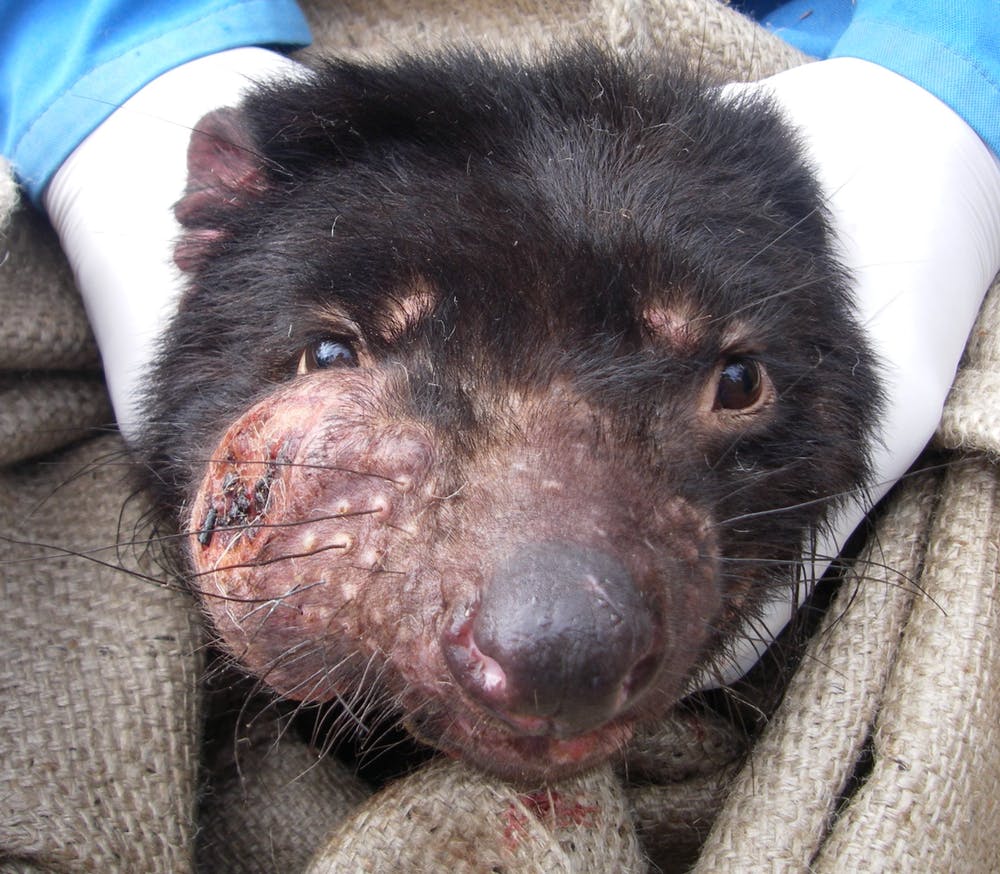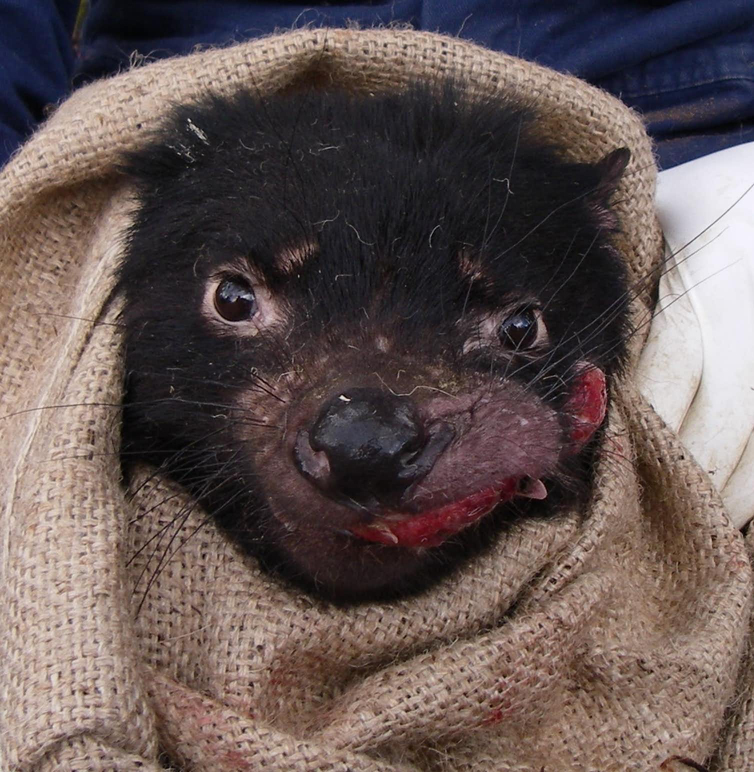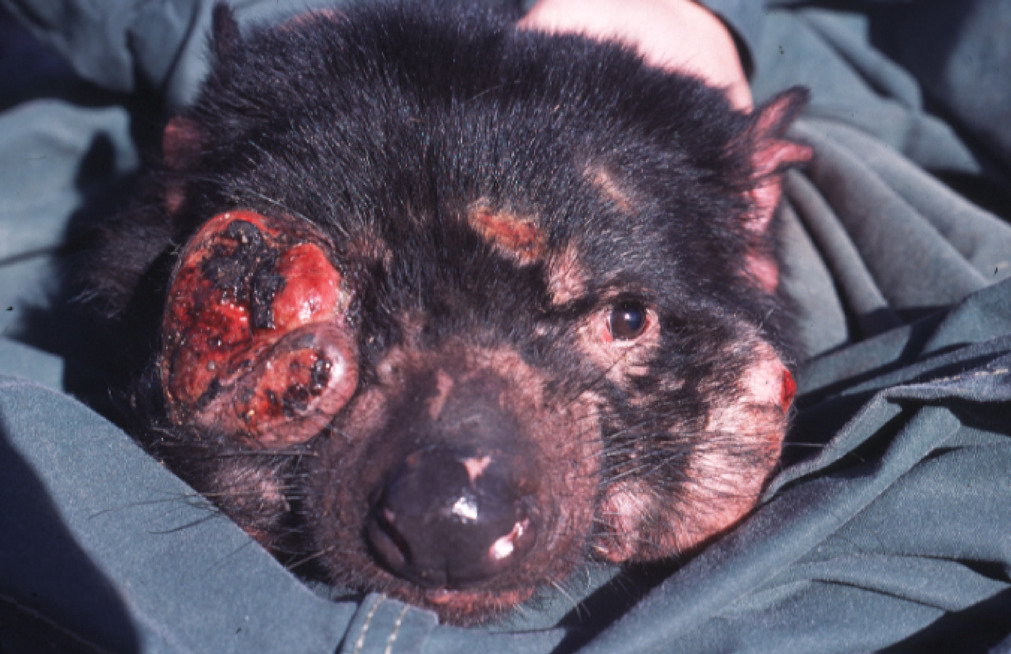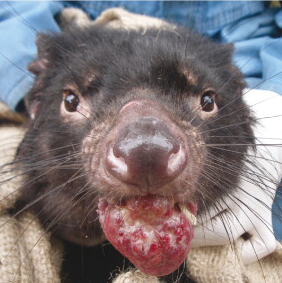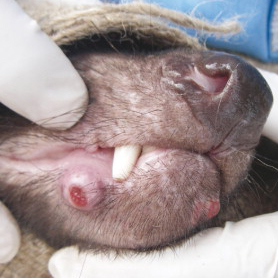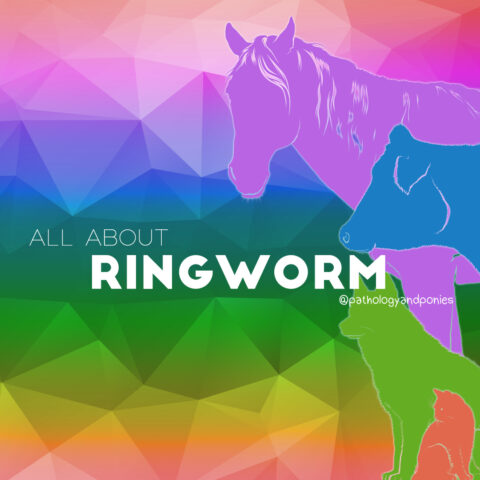Today’s path rounds are on 𝐝𝐞𝐯𝐢𝐥 𝐟𝐚𝐜𝐢𝐚𝐥 𝐭𝐮𝐦𝐨𝐮𝐫 𝐝𝐢𝐬𝐞𝐚𝐬𝐞 (DFTD)!
𝐖𝐡𝐚𝐭 𝐢𝐬 𝐢𝐭?
𝐃𝐞𝐯𝐢𝐥 𝐟𝐚𝐜𝐢𝐚𝐥 𝐭𝐮𝐦𝐨𝐮𝐫 𝐝𝐢𝐬𝐞𝐚𝐬𝐞 is a type of transmissible cancer that has been devastating Tasmanian devil populations in Australia. At one point, over 80% of the Tasmanian devil population was lost due to this disease, making scientists very concerned the species would go extinct. The tumour primarily affects the face, causing large masses and interfering with the devil’s ability to eat. The devils often end up starving to death because they simply can’t cope with the large masses.
𝐖𝐡𝐨 𝐠𝐞𝐭𝐬 𝐢𝐭?
Any Tasmanian devil can get this disease!
𝐇𝐨𝐥𝐝 𝐨𝐧, 𝐝𝐢𝐝 𝐲𝐨𝐮 𝐬𝐚𝐲… 𝐭𝐫𝐚𝐧𝐬𝐦𝐢𝐬𝐬𝐢𝐛𝐥𝐞 𝐭𝐮𝐦𝐨𝐮𝐫?
You bet I did! This type of tumour is incredibly rare, and not a whole lot is known about them. In fact, there are only three known mammalian transmissible tumours: DFTD, a canine tumour (probably the subject of a future post!) and a hamster tumour. This particular tumour is spread when a devil bites another, and introduces tumour cells into the bite wound.
𝐖𝐡𝐚𝐭 𝐜𝐚𝐮𝐬𝐞𝐬 𝐢𝐭?
As I said, not much is known about transmissible tumours in general. However, the scientific community is working hard to try and understand them! One of the biggest questions researchers have is “how do the tumour cells escape the immune system?”
Normally when foreign cells are introduced into the body, the body produces an 𝐢𝐦𝐦𝐮𝐧𝐞 𝐫𝐞𝐬𝐩𝐨𝐧𝐬𝐞 to kill the cells. You may have heard of this concept in relation to organ transplant rejection. In DFTD, cells from another devil are directly introduced into a wound, which would normally stimulate the immune system. However, this does not occur, allowing the tumour cells to proliferate! Current research suggests that the tumour cells have reduced numbers of 𝐦𝐚𝐣𝐨𝐫 𝐡𝐢𝐬𝐭𝐨𝐜𝐨𝐦𝐩𝐚𝐭𝐢𝐛𝐢𝐥𝐢𝐭𝐲 𝐜𝐨𝐦𝐩𝐥𝐞𝐱 𝐦𝐨𝐥𝐞𝐜𝐮𝐥𝐞𝐬 on their surface, which are molecules that help the molecules recognize a foreign cell. Without these molecules, the immune system never gets the “signal” to destroy the invading cells. Crazy!
𝐖𝐢𝐥𝐥 𝐓𝐚𝐬𝐦𝐚𝐧𝐢𝐚𝐧 𝐝𝐞𝐯𝐢𝐥𝐬 𝐛𝐞 𝐨𝐤𝐚𝐲?
There is some interesting research going on that is tracking the DNA of Tasmanian devils, and they have found some interesting results! They have shown that there have been evolutionary changes in Tasmanian devils, with increased expression of genes related to immune function. This suggests that the devils have evolved to better handle the disease, in just 5 generations of tracking! In fact, there have been reports of devils having their tumours shrink and even disappear, which is amazing and gives researchers a lot of hope that the species will survive into the future. Go devils go!
𝐏𝐡𝐨𝐭𝐨𝐬
1-5) Examples of devils with DFTD!
𝐒𝐨𝐮𝐫𝐜𝐞𝐬
McCallum, H., Patton, A.H. Tasmanian devils look set to conquer their own pandemic. The Conversation, 2020.
Tasmanian devil facial tumour diseases. University of Cambridge Transmissible Cancer Group.
McCallum, H. Tasmanian devil facial tumour disease: lessons for conservation biology. Trends in Ecology and Evolution, 2008.
Photo 1 courtesy of Wikimedia Commons.
Photos 2-4 courtesy of Rodrigo Hamede.
Photo 5 courtesy of Hamish McCallum.

